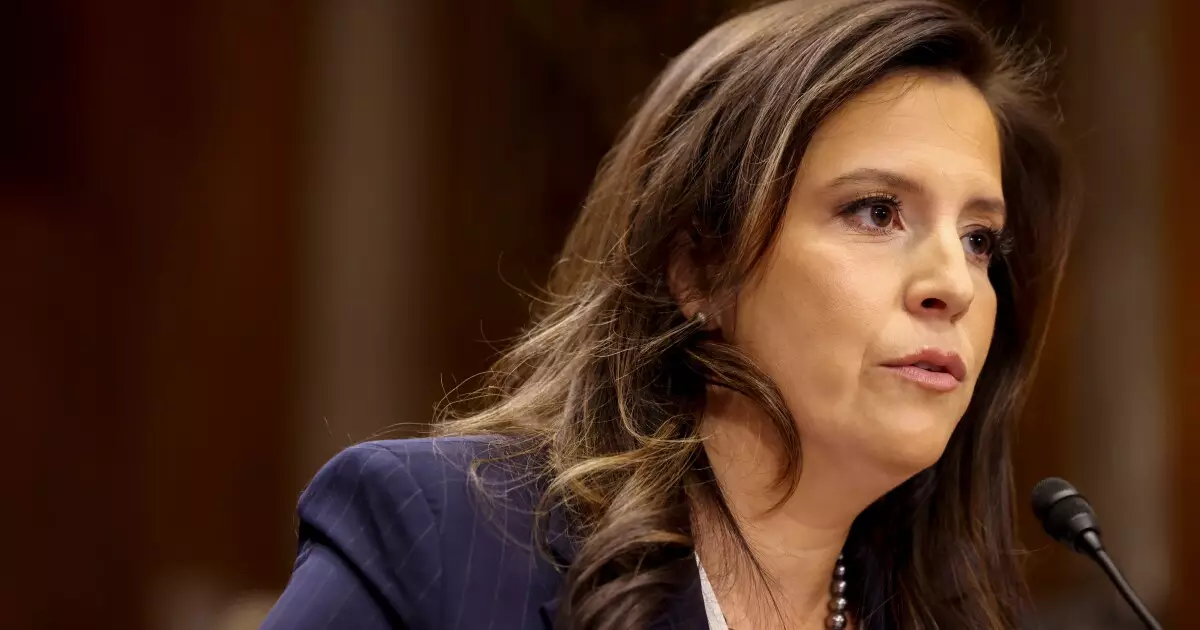In the rarified air of academic excellence, few institutions command the respect and resources that Harvard University does. However, recent developments surrounding a bond sale reveal the cracks in this illustrious facade, leading to serious scrutiny from political figures, notably New York Republican Rep. Elise Stefanik. Her request for the Securities and Exchange Commission (SEC) to investigate a significant bond issuance by Harvard raises troubling questions about the transparency and ethical obligations of one of America’s most prestigious universities.
Stefanik argues that Harvard may have withheld critical information from investors, particularly about its ongoing conflict with the Trump administration. The bond sale itself, which took place in April, exemplifies the financial complexities that often accompany such institutional maneuvers. Harvard’s decision to sticker its bonds with a late supplemental disclosure suggests that all was not well beneath the surface. This tensions the usual equilibrium of trust that investors place in educational institutions, especially those like Harvard that boast triple-A ratings.
Transparency and Investment Ethics Under Fire
At the heart of the inquiry is whether Harvard knowingly concealed its plans to reject federal aid conditions presented by the Trump administration during the bond sale. As Stefanik points out in her June letter to SEC Chair Paul Atkins, discrepancies between initial and follow-up disclosures cast a shadow over the university’s integrity. Investors expect full disclosure of risks, particularly when navigating the potentially choppy waters of government relations.
Why does this matter? When an institution of Harvard’s stature possibly chooses to prioritize political posturing over transparency, it becomes a matter that transcends local or even national news. It sends ripples through the municipal market, where Harvard’s bonds are seen not merely as financial instruments but as representations of the academic elite’s often complex relationship with government entities. If the allegations hold merit, it could reconsider the obligations these institutions owe to the public and invest in a more ethical approach to financing.
The Illusion of Safety in Academic Investments
Adding another layer of intrigue to this unfolding drama, Stefanik raised concerns about the valuation of Harvard’s staggering $53 billion endowment, which many consider sacrosanct. The representative hints that these funds might be overvalued, comprising a significant amount of illiquid assets in private equity and real estate. If her assertions prove correct, the financial health of the institution could be far more precarious than Harvard would admit, particularly in a downturn.
Interestingly, this concern is borne out of current economic conditions that have left many organizations, especially educational institutions, vulnerable to shifts in interest rates and market dynamics. Investors should be wary. The combination of high leverage and a ballooned-value asset base could create a ticking time bomb under what seems to be a fortress. Harvard, with its extensive resources and long-established reputation, is operating at a perilous intersection of prestige and responsibility.
Political Maneuvering and Higher Education
The role of politics in higher education has rarely been as pronounced as it is today. Stefanik’s actions form part of a broader campaign by Republicans to scrutinize elite institutions, particularly those that oppose the prevailing administration’s policies. This instance places Harvard firmly in the crosshairs, suggesting that political loyalty might be an unwritten prerequisite for federal funding in today’s climate.
With alliances becoming increasingly transactional, the notion that a university could face repercussions for not playing ball raises a host of ethical questions. Are these institutions public servants tasked with higher education, or do they become pawns in an ever-growing political theater? The implications extend far beyond Harvard, shaking the very foundation of trust that society places in educational entities.
Investors at the Crossroads: A Cautionary Tale
The recent developments surrounding Harvard’s bond sale underscore a cautionary tale for investors navigating the complex nexus of finance and academia. As Jeff Timlin, a managing partner at Sage Advisory Services, emphasizes, skepticism is critical. When red flags emerge, it may be wiser for investors to proceed with caution, and an SEC investigation may be a necessary step to uncover the truth.
The situation begs one vital question: Is the risk worth it? As the municipal market fluctuates, and Harvard’s reputational wattage dims slightly under scrutiny, potential investors are left to weigh the allure of attractive returns against the specter of potential misrepresentation. What used to be safe bets are now riddled with uncertainties, and those in the market must be vigilant to avoid being ensnared in a web of possible deception that stretches far beyond the ivy-covered walls of Harvard University.

